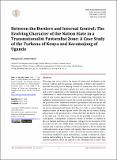Between the Borders and Internal Control: The Evolving Character of the Nation State in a Transnationalist Pastoralist Zone: A Case Study of the Turkana of Kenya and Karamojong …
Abstract/
This paper sets out to analyze the impact of nation-state modernity on the pastoral Turkana and Karamojong communities of Kenya and Uganda respectively. Focusing on two defining features of a nation-state, that is, borders and internal control, the study explores how and to what extent the political and security organization of the traditional pastoral communities have been transformed as a result of the nation-state project. The paper argues that the political and security organization of the two neighboring communities has undergone minimal transformation due to weak penetration of the states in the pastoralist zone. Traditional notions of government and security are still dominant and pose a challenge to the operation of the state. At the same time, the advent of international borders has done very little to control illegal immigration across the Kenya-Uganda border. Not only are the borders lacking demarcation on the ground over a century after they are drawn on the map, in the same vain, but also large sections are not patrolled or secured by national police. Consequently, traditional concept of borders―as defined by physical features and historical memories―still govern the movement of the pastoralists in the zone. While Kenya and Uganda have separately imposed coercive and co-optation activities on the pastoralists in a bid to subdue the traditional notions of government and security, these measures have yielded minimal results on the ground. At best, the state-led security policies and activities have sparked off tension and resistance, leading to widespread conflict, violence and instability in the zone. The obtaining chaotic situation raises fundamental questions about the capacity of the adjoining state to police their borders and to exercise internal control over their respective populations as widely presumed by the Realist School. The paper concludes that the nation-state still exists as an unaccomplished project in the zone, at least from the standpoint of borders and internal control.

